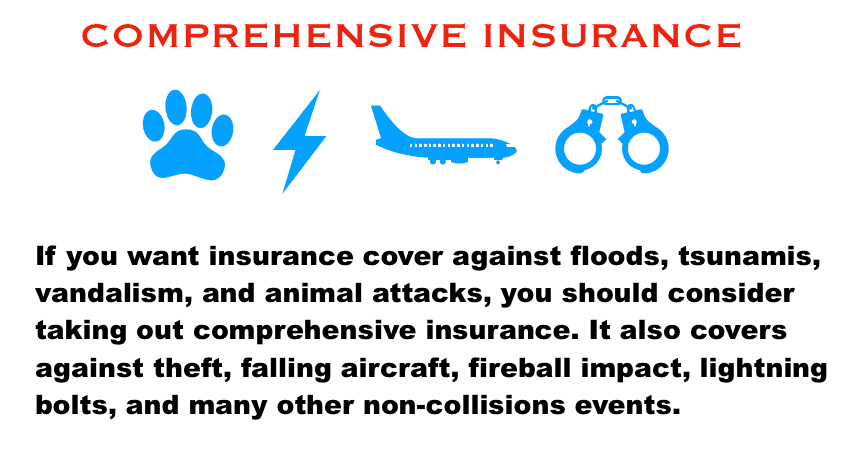Comprehensive insurance – definition and meaning
Comprehensive insurance is a type of vehicle coverage that protects the policyholder against all types of damage. It protects you from the cost of damages, but does not prevent the damage from occurring. Comprehensive insurance also covers you for theft and damage not resulting from a collision.
This type of insurance covers policyholders for a variety of events that could damage their vehicle, including rock-slides, fire, or vandalism.
Comprehensive insurance is one of hundreds of different insurance products one can buy.
Also known as ‘fully comp cover,’ it is a high level of protection you can get for your car.
Cheaper forms of car insurance, such as ‘Third Party’ and ‘Third Party, Fire, and Theft’ provide less protection. For example, they do not cover damage to your car.
In fact, the cheap policies only cover damage to others as the result of an accident. Comprehensive insurance covers the policyholder’s car as well as personal injury to the driver and passengers.
 According to businessdictionary.com, comprehensive insurance is the:
According to businessdictionary.com, comprehensive insurance is the:
“Widest form of auto insurance protection that (in case of a collision, fire, or theft) covers the insured driver and vehicle, third-party driver and vehicle, and third-party property.”
Comprehensive insurance cheaper today
Over the past ten years, comprehensive insurance has become much cheaper. In fact, in the United Kingdom, it is often now cheaper than the lesser ‘Third Party, Fire and Theft’ cover.
Depending on your comprehensive policy, there are different deductible amounts (UK: excess payments) made to the repair workshop.
In most cases, the insurance company will need to authorize the estimate before it agrees to pay for the repairs.
When the garage has done the repairs, policyholder pays that garage the excess payment. The insurance company pays the remainder.
When it is a non-fault case, the insurance company goes after the other party’s insurer to recover the money it had to pay. However, it will only do this if it believes the other party was at fault.
What does comprehensive insurance cover?
According to the Association of British Insurers, details on each policy vary from insurer to insurer. Comprehensive policies cover everything that cheaper policies do, plus:
- Injuries to or the death of other parties, including your vehicle’s passengers.
- Damage to the other party’s property.
- Accidents that a passenger in your car caused.
- Damage or accidents that a trailer or caravan attached to your car caused.
- The theft of your vehicle.
- Any fire damage.
- Accidental damage to your car.
Comprehensive insurance covers you regardless of whose fault it is.
Comprehensive insurance may also cover:
– Personal accident benefit – policyholders or their beneficiaries receive money if they die. The insurer also pays out if the policyholder becomes permanently disabled. However, this must be as a direct result of an accident.
– All medical expenses, up to a set limit that injured people incurred as a result of an accident.
– Any loss or damage to personal items. There is also a set limit.
Video – Comprehensive insurance
This Be Wiser Insurance’ video explains what fully comprehensive insurance is. It also explains what the benefits are.

